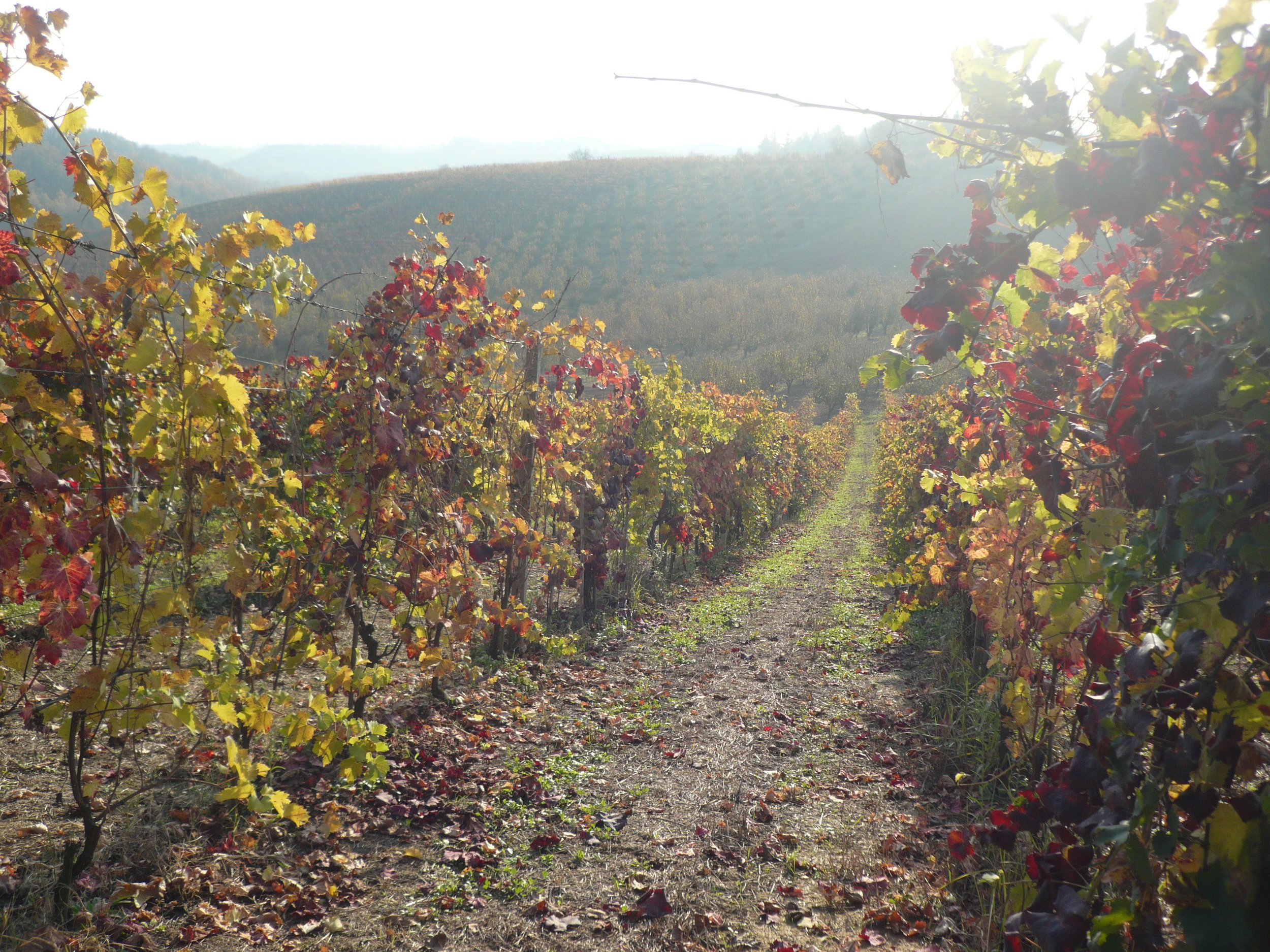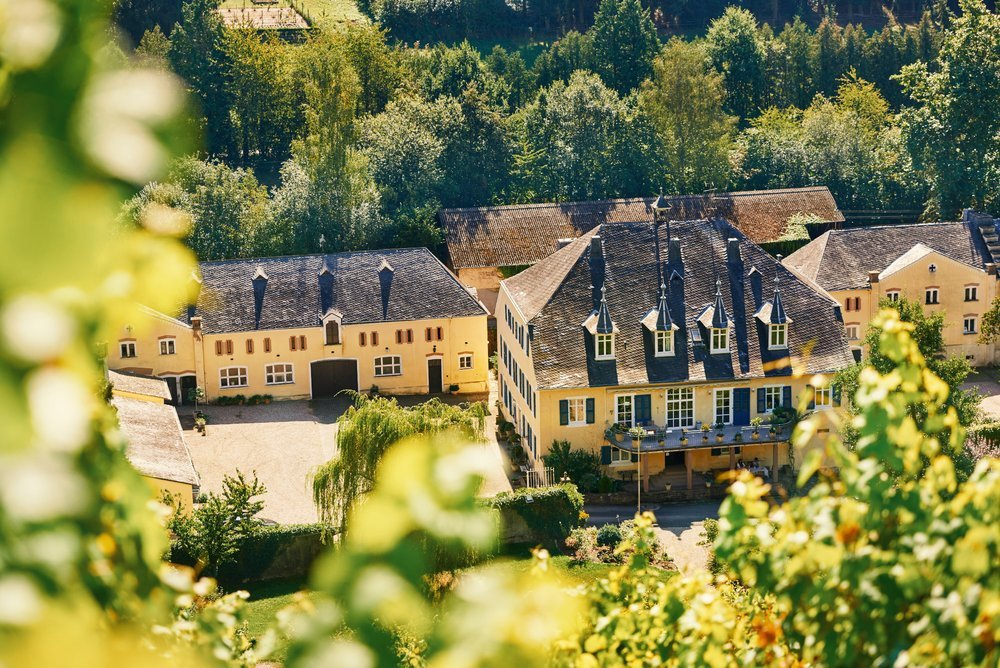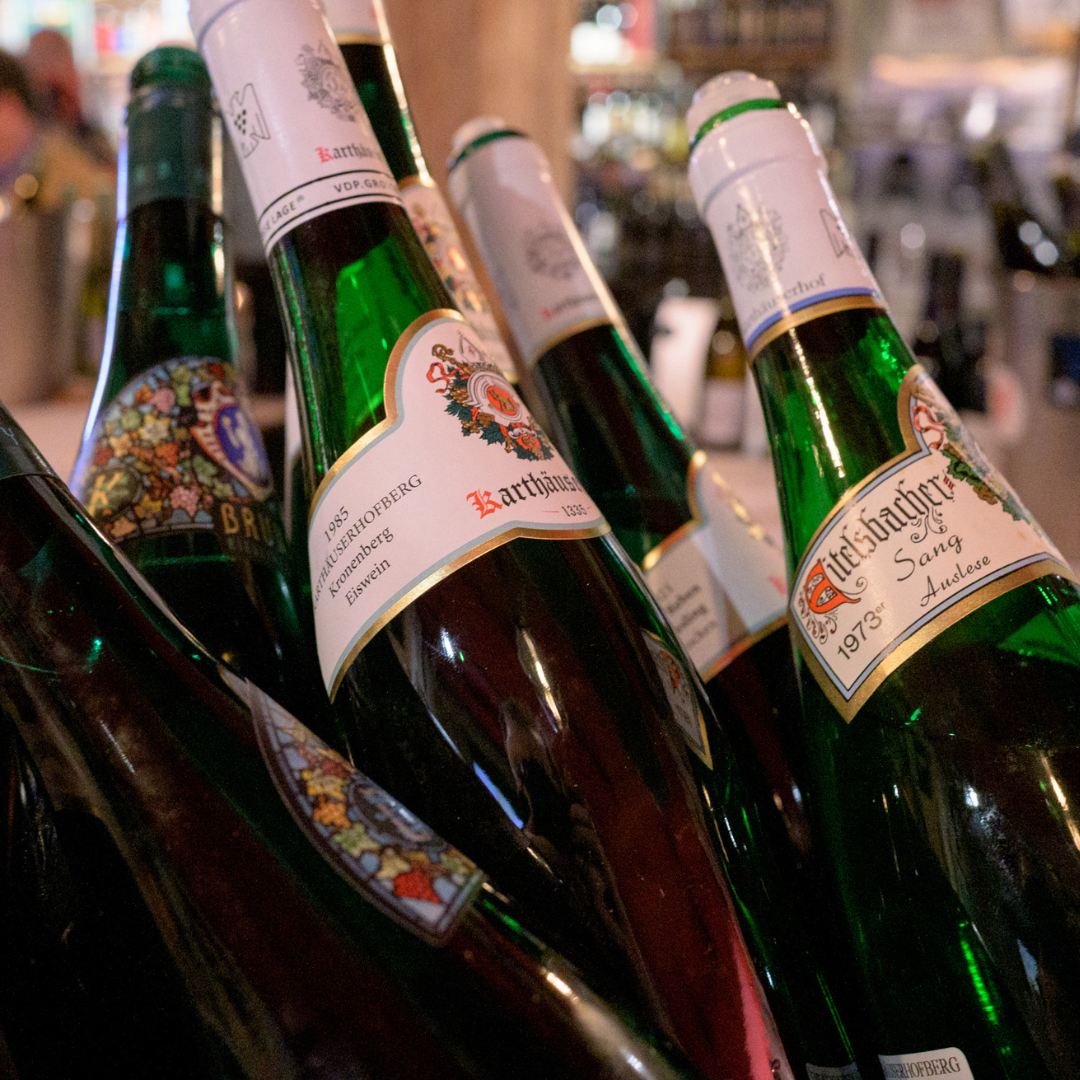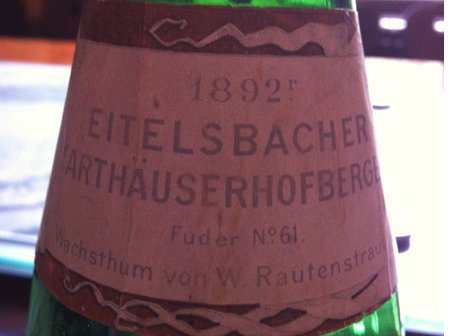
Karthäuserhof
Trier-Eitelsbach, Ruwer, Germany




Karthäuserhof is one of the great estates of Germany, with a complex and storied history that dates back centuries. Carthusian monks founded the property, a Hof, or working farm, in 1335, making it one of the oldest estates in Europe (the 8th oldest in the world, according to them). Recent findings, dating back to Roman times, show that a settlement with viticulture likely existed at Karthäuserhof even before the establishment of the monastery. Much like its neighbor, Maximin Grünhaus, wine was made and consumed by the monks continually for almost 500 years. Following secularization under Napoleon, Karthäuserhof was auctioned off in Paris in 1811. Valentin Leonardy, a Francophile, bought the estate and the property has been in the same family since, first as the Rautenstrauchs, then as the Tyrells and now as the Behler family.
The jewel in the crown here is the famed Karthäuserhofberg vineyard, a 19-hectare monopole site all in one block, with a mostly south and southwest-facing exposition. The site, on the right bank of the Ruwer, is open to the west, closed to the east and consists of reddish soil covered with weathered gray slate. It's an iron-rich soil which is ideal for wine. The vineyard is planted almost entirely to Riesling on original rootstock. The Karthäuserhofberg vineyard has obviously been highly regarded for centuries and is featured in the famed Prussian Saar und Mosel Weinbau-Karte of 1868, a tax map for the district of Trier, where it is listed under the name Kartauserberg.
Karthäuserhof produces a range of styles, from prädikat level Kabinetts, Spatlesen and Auslesen, to off-dry feinherb wines, to their famed Grosses Gewächs trocken wines. The wines are known for the ability to age and maintain a remarkable freshness throughout. The style at Karthäuserhof, especially with the trocken wines, emphasizes a classic interplay of minerality, acidity and fruit, that creates a breathtaking energy and an almost electric tension.
The distinctive neck label, which has since been trademarked and has contributed to the wine’s fame. Is said to have originated when Wilhelm Rautenstrauch, the first owner after the Carthusians, would secretly meet in a back part of the garden with a gazebo to drink wines and play cards with friends. To keep the bottles cool, he would stand them up in the Eitelsbach brook that runs by the property into the Ruwer. The problem was that the labels would regularly come off from the bottles. To remedy this, he had the brilliant idea of having just a neck label, which has adorned bottles of the Karthäuserhof for more than 100 years ever since.
In 2020, Mathieu Kauffmann, formerly chef de cave at Bollinger and later responsible for the organic conversion of the Von Buhl estate in the Pfalz, was hired as technical director. He has been instrumental in streamlining the range of available wines and, most importantly, beginning the process of converting the entire estate to organic viticulture. As of 2022, 30% of the vineyards are fully organic.
The following is only a selection of the wines that we carry from Karthäuserhof. Please contact your salesperson for a complete list of current wines on offer from the estate, including magnums of library vintages of Karthäuserhofberg GG.
Our Selections
Karthäuserhof Sekt Brut
The idea for Karthäuserhof sparkling was first conceived in the early 19th century by then owner Valentin Leonardy. Enamored with the sparkling wine of high society, his dream finally came to fruition six generations later.
In 2020, proprietor Albert Behler hired the renowned oenologist and Champagne expert Mathieu Kauffmann — the Champagne Bollinger Chef de Cave for 13 years — to oversee all wine production and begin working on the the first Karthäuserhof Sekt. Matthieu has also been instrumental in establishing the rules of the VDP Sekt consortium in Germany.
After looking at the unique characteristics of the Karthäuserhof vineyards, especially the monopole Karthäuserhofberg, it became clear that the sparkling must be made of Riesling and Pinot Blanc. The Devonian-slate Karthäuserhofberg is home to Pinot Blanc as well as Riesling, providing depth and structure. The Mertesdorfer vineyard add finesse and elegance. And grapes from the cooler sites in Waldrach add freshness and lift.
After harvest, the grapes are gently pressed and the must ferments spontaneously. Aging takes place in stainless steel tanks and wooden barrels and the base wines are matured on gross lees. The final cuvée is a blend of 80% Riesling and 20% Pinot Blanc, entirely from the 2020 vintage. The wine was then bottled and aged on lees for 36 months and disgorged in August 2024.
On the nose, the wine is exceptionally delicate. Fennel, lime, lemon, and subtle brioche notes underpinned by the typical, stony minerality of Karthäuserhof. The acidity runs with precision, not austerity. On the palate, an herbal spice and wet-stone minerality are emphasized by lemon and lime freshness. In other words, Champagne with German DNA.
Alc. 12% Vol. / Residual Sugar: 1.7 g/l / Acidity 7.5 g/l
Karthäuserhof Riesling Trocken Bruno 2021
Bruno is a new line of well priced Rieslings from Karthäuserhof. The name is an homage to Bruno from Cologne, the founder of the Carthusian order, whose monastery is the origin of the estate. Made from grapes grown in steep vineyards in the Mosel and Ruwer valleys with optimum exposition on slate soil. The grapes for the Bruno Dry were harvested by hand in early October and gently pressed. In the cellar, the wine was fermented with as little intervention as possible. No fining and all natural sedimentation.
Refreshing, spicy, floral nose of grapefruit, yellow peach, and green apple. Nicely balanced on the palate with hints of juicy ripe fruits and a zesty, herbal and spicy finish. Bottled in a classic blue/green hock bottle with a screw cap.
11% Alc., 6.2 g/l RS, 7.6 g/l acidity
Karthäuserhof Riesling Kabinett Bruno 2022
Bruno is a new line of well priced Rieslings from Karthäuserhof. The name is an homage to Bruno from Cologne, the founder of the Carthusian order, whose monastery is the origin of the estate. Made from grapes grown in steep vineyards in the Mosel and Ruwer valleys with optimum exposition on slate soil. The grapes for Bruno were harvested by hand in early October and gently pressed in the cellar with no fining and all natural sedimentation.
A wonderfully aromatic Riesling Kabinett with notes of yellow fruit and citrus on the nose. The palate is harmonious and balanced with the signature tension of sweetness and acidity that makes Kabinett wines from Karthäuserhof so easy to drink.
9.5% Alc., 28.2 g/l RS, 9.1 g/l acidity
Karthäuserhof Riesling Trocken Schieferkristall 2021
Schieferkristall, meaning slate crystal, is 100% estate Riesling from steep vineyards in the Karthauserhofberg monopole, as well as vineyards in Mertesdorf and Waldrach (all in the Ruwer valley). These sites all posses unique microclimates and a distinctive Devonian slate soil. Karthauserhof has made Schieferkristall as a dry Kabinett for the past two decades. Gentle pressing, followed by fermentation with native yeasts in stainless steel. The wine sees lees contact for almost six months before racking and bottling.
The Schieferkristall features a delicate yet dense apricot aroma and a polished slate tone. Pure, fresh and vital on the palate, it is a substantial, tightly structured yet juicy and persistently aromatic Ruwer Kabinett (though it is not declared as such for ask-the-VDP reasons) with tension and a stimulating salty finish. More serious, complex and structured compared to Bruno.
11.0% Alc., 6.3 g/l RS, 7.3 g/l Acidity
Karthäuserhof Riesling Trocken Schieferkristall 2013 (Library)
Schieferkristall, meaning slate crystal, is 100% estate Riesling from steep vineyards in the Karthauserhofberg monopole, as well as vineyards in Mertesdorf and Waldrach (all in the Ruwer valley). These sites all posses unique microclimates and a distinctive Devonian slate soil. Karthauserhof has made Schieferkristall as a dry Kabinett for the past two decades.
Gentle pressing, followed by fermentation in temperature-controlled stainless steel. The wine sees lees contact for almost six months before being filtered and bottled in September 2014.
The 2013 Schieferkristall combines the strengths of the region perfectly: low alcohol, cool fruits, lots of minerality and the added complexity of time in bottle. Still super fresh with delicate citrus notes, green apple, and gooseberry, with slate and spiciness. This is light-footed and powerful at the same time.
10.0% Alc., 7.7 g/l RS, 8.1 g/l Acidity
Karthäuserhof Riesling Eitelsbacher Alte Reben 2021
Fruit for Eitelsbacher Alte Reben comes from 30+ year old vines (up to 75-years old) in the Eitelsbacher Karthäuserhofberg. The grapes were crushed and pressed, with natural fermentation occuring in a mix of stainless steel and 1,200L oak barrels. After fermentation the wine is allowed to mature on the gross lees for at least eight months before racking and bottling.
The wine shows the typical flavors and mouthfeel of the unique combination of Devonian slat and iron in the soil: intense nose, very mineral and spicy, white stone fruit, crisp pear and hints of citrus. Velvet and extremely juicy on the tongue, invigoration acidity without any sharpness. Built for the long haul but also wonderful to drink now.
11.0% Alc., 4.1 g/l RS, 5.7 g/l Acidity
Karthäuserhof Karthäuserhofberg Riesling Kabinett 2021
This is a masterclass in terroir expression. 100% of the fruit for Karthauserhof’s Kabinett is sourced the Eitelsbacher Karthäuserhofberg monopole. With an optimal south-southwest orientation and a slope of up to 55%, this microclimate produces tremendous Rieslings grown on pink-copper-colored Devon slate.
The grapes are harvested by hand, then gently pressed and fermented in stainless steel. The wine then matures on the full lees for about six months months.
The spicy, sponti nose still dominates, but then the first fruit notes — juicy peach, grapefruit, white currant — and the slate literally pushes itself out of the glass. Very juicy and densely woven on the palate, the sweetness well integrated and balanced by an invigorating acidity. This is a Kabinett that will continue to reveal new faces over the next two decades.
9.0% Alc., 30.0 g/l RS, 10.4 g/l Acidity
Karthäuserhof Riesling Karthäuserhofberg GG 2020
The famed monopole Karthäuserhofberg vineyard faces south by southwest and covers almost 20 hectares. It stretches up to 254 meters above sea level with gradients of up to 55%. The unique microclimate of the area, plus the distinctive Devonian slate soil, has created the ideal combination for producing unforgettable Rieslings.
The grapes for the 2020 Grosses Gewächs come mainly from the “Kronenberg” site, the oldest plot within the vineyard, with ungrafted vines that are more than 80 years old. Very ripe and healthy grapes were carefully brought to the cellar, then gently pressed after a few hours of skin contact. Fermentation occurs with native yeasts partially in oak barrels and stainless steel. After fermentation the wine is allowed to mature on the full lees for at about twelve months, and the release of the GG is not until two years after harvest.
The wine shows a ripe, aromatic nose of pineapple, almond, mirabelle, some buttery elements and honeyed yellow fruits. While delicately fruity and creamy on palate, with the yet fresh and citrus-driven finish. Tons of aging potential here, so enjoy it over the next 20+ years.
Karthäuserhof Riesling Karthäuserhofberg GG 2018
The famed monopole Karthäuserhofberg vineyard faces south by southwest and covers almost 20 hectares. It stretches up to 254 meters above sea level with gradients of up to 55%. The unique microclimate of the area, plus the distinctive Devonian slate soil, has created the ideal combination for producing unforgettable Rieslings.
The grapes for the 2018 VDP Grosses Gewächs come mainly from the “Kronenberg” site, the oldest plot within the vineyard, with ungrafted vines that are more than 80 years old. Very ripe and healthy grapes were carefully brought to the cellar, then gently pressed after a few hours of skin contact. The fermentation took place under a controlled temperature of 16-19 °C in stainless steel with natural yeast. After several months on the fine lees the wine was filtered and bottled in August 2019.
This is a stunning dry Riesling featuring notes of apple, pear, lemongrass and green tea. It has a delicate palate with nice minerality, complexity and a long finish. Delicious and ready to drink now.





